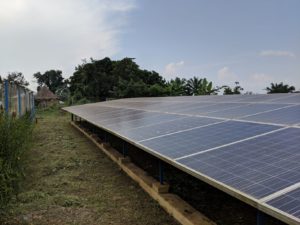Sustainable energy access and transitions
 Nearly one billion people worldwide lack any access to electricity, and 3 billion people cook with traditional, polluting technologies. My work on energy access is broadly focused on identifying effective solutions to the energy poverty problems that stem from these realities, and is closely related to my other research on the factors that influence demand for improved environmental health and the costs and benefits of technology adoption. Reliance on traditional energy sources generates massive health, environmental, and productivity harms that particularly affect women and young children living in poor, rural households. And modern energy service provision, like water and sanitation, is subject to a variety of market failures – natural monopoly, pollution externalities, imperfect information or knowledge of risks, and thin / missing complementary rural markets. Interventions in the energy sector are also often costly, and stretch public and other financing budgets, leading many to question the rationale for investing in this domain.
Nearly one billion people worldwide lack any access to electricity, and 3 billion people cook with traditional, polluting technologies. My work on energy access is broadly focused on identifying effective solutions to the energy poverty problems that stem from these realities, and is closely related to my other research on the factors that influence demand for improved environmental health and the costs and benefits of technology adoption. Reliance on traditional energy sources generates massive health, environmental, and productivity harms that particularly affect women and young children living in poor, rural households. And modern energy service provision, like water and sanitation, is subject to a variety of market failures – natural monopoly, pollution externalities, imperfect information or knowledge of risks, and thin / missing complementary rural markets. Interventions in the energy sector are also often costly, and stretch public and other financing budgets, leading many to question the rationale for investing in this domain.
 My work on energy poverty and solutions to it comprises several key threads:
My work on energy poverty and solutions to it comprises several key threads:
- Synthesis of evidence, via systematic reviews of mostly quantitative evidence related to the development and environmental outcomes of both electrification and clean cooking interventions;
- Field-based evaluations of the effectiveness of various programs and interventions, such as the Millennium Challenge Corporation’s investment in a renewable energy access facility in Benin, or an effort to promote electric and other cleaner cooking technologies in Uttarakhand, India; and
- Leadership of the Duke University Energy Access Project, an integrated research, teaching, and engagement effort aimed at solving this significant global challenge.
Originally not central to my academic identity, I became interested in energy work due to the compelling nature and urgency for solving problems lying at the nexus of climate change and development. In my view, funding sustainable solutions to these interconnected issues constitutes the central conundrum of our times, because they threaten the very future of humanity.


